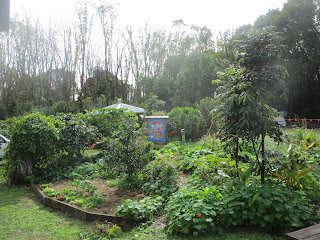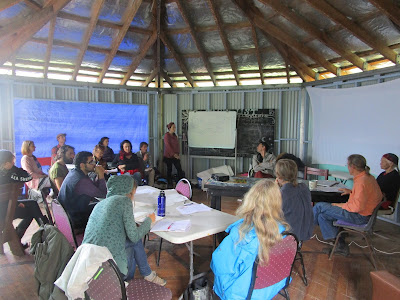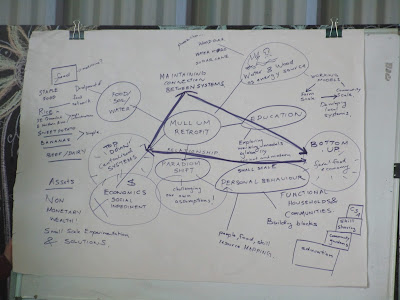Last weekend I was fortunate enough to have the chance to participate in the Retrofit Mullumbimby Workshop with David Holmgren the co-originator of the Permaculture Design Science and also listen to his Aussie Street talk the day before in the Mullumbimby Civic Hall.
David Homlgren's Aussie Street talk at the Civiv Hall in Mullumbimby
Davids Aussie Street talk deals with the Energy Descent Future ahead of us and asks the question of how will the typical suburban australien household deal with an energy descent future when less cheap oil will be available and climate change effects us. In a country were there are in total 8 Mio. empty bedrooms in massive houses. This type of questions were raised :
What will we eat? What will it cost?
What will we do with all the open spaces in a typical Australien suburban
environment?
What type of economic system will be present?
What will we do with coastal real estate that has lost its value as climate change
is in full effect ?
Can Permaculture renew suburbs after the property bubble collapses?
What type of opportunities are going to be there?
Many examples and possible solutions have been discussed reaching from a renewable solar-powered agriculture systems,Community Supported Agriculture , non monetary economics, re-localization , community networks and collaboration.
A few actions to kick-start the re-localization process have been mentioned:
Get producing & support local producers
Review needs & reduce consumption
Share your place! Get in a boarder!
Car pool
Get out of debt
Network for inspiration & information
During the talk several times for me the importance of collaboration and shift in personal behaviors have come up. The utmost importance of social connection and re-localization with a focus on resilience and productivity using Permaculture as a model for direct change.
A very clear and inspiring statement from one of Davids publications always keeps coming back to me:
…...the ways we observe & fail to see,the ways we think & fail to grasp,the ways we speak & fail to listen are all more important to the long term achievement of a sustainable society then any particular information about appropriate technology,plant and animal species or land management. While
information & experience with these elements in the Permaculture toolkit are necessary they do not of themselves lead to sustainable systems.
The focus of collaboration,co-operation and personal transformation becomes very clear after David mentioned to the group:
How many competent backyard gardeners have we produced in the last 30
years of Permaculture? How realistic is the future of all of us growing their own
food in a Permaculture way on their own land?
This question come to my mind:
Do we all need to collaborate together and set up local food systems which are ethical and environmental sustainable?
The next day we meet at 9am at the Community Gardens of Mullumbimby an
very inspiring place and project.
A part of Community Gardens Mullumbimby
The workshop started with a short introduction of Davids 30 year long work at his own place Melliodora in Victoria. Its was really really inspiring to here directly from him and his partner Su about the successes and challenges of 30 years Permaculture Design,Education and Living.
David and Su sharing details about Melliodora
David Holmgren has been recommending for 30 years: to engage in a shift away from being a dependent consumer, and toward being a responsible self-reliant producer for your household and community, and to shift a significant portion of assets out of the mainstream economy and move them into building household and community resilience.(from Integral Permaculture.wordpress.com)
Melliodora is one of the only places with an in depth study and documentation of the effects and benefits of a Permaculture system operating for 30 years and is definitely one of the best managed and established Permaculture sites in the world . David documented very well all the yields , inputs and outputs of his specific site. At Melliodora David and Su have worked within the following areas which are of great importance for resilience:
History and Connection to place
Constraints of climate an wildlife
Surveying the opportunities
Earthworks
Ecological building materials
Passive solar design – cooling,heating,food storage
Waterharvesting
Nutrient cycling & soil building
Garden agriculture – food security,health , conservation
Tree crops – food,fodder and mulch
Working with animals – yield & ecological services
Harvesting wild abundance – mushrooms,bees,berries
Local and seasonal food culture
Low energy food preserving
Immersing children in holistic living
A focus on shared food
Renewable energy from low to high tech
Creative re use and manufacture
Learning from novel ecosystems
Food Forests for the future
Community supported agriculture
Volunteering and exchange
Publishing and documentation
Sharing the space and connecting to the world
Communicating the message
Measuring & monitoring your project
The following two question were raised during David presentation:
Can we measure resilience?
Does resilience also reduce environmental impact?
Together we were also looking at resilience indicators before we move on to the presentation of the Energy Descent Action Plan (EDAP) for a Brown Tech future. The theme was planning positively for a world of less while we hope for the best but assume the worst. The Energy Descent Scenarios were clearly outline to us:
It was made clear to us that severe climate change and rapid collapse of our resource base could easily trigger a major crisis which most of us are not prepared for. We realized that a crisis also creates opportunities and breaks open a door for new possibilities. The knowledge of this possibilities that might come up connects us to the importance of preparedness to make best use of new opportunities. The valuable skills of practical self-reliance,collaboration and Permaculture Design will help us to make direct change in the following areas:
Land and nature stewardship
Buildings and infrastructure
Tools and technology
Education and culture
Health and spiritual well being
Finance and economics
Land tenure and community governance
We also brainstormed together in groups useful strategies for specific energy descent scenarios.
Following the brainstorm,we discussed all together strategies to retrofit Mullumbimby and their aim of 100% sustainability in the near future.
A quick mindmap with input from Davidś years of experience and knowledge was created and will be a useful resource for the future work of the Mullumbimby action groups.
Afterwards we had a good lunch of local organic home made food before the action groups of Mullumbimby meet for their 2nd yearly meeting to share,connect and exchange. For me it was impressive to see how forward thinking and active the local community in Mullumbimby is and it gave me a lot of hope and inspiration for the future ahead.
Thanks so much to David for his inspiring talks and wealth of knowledge,to all the activists involved in direct action in the Mullumbimby area and the organizers from Free Farm for their great work and dedication.It was really a great start into the weekend !
David Homlgren's Aussie Street talk at the Civiv Hall in Mullumbimby
Davids Aussie Street talk deals with the Energy Descent Future ahead of us and asks the question of how will the typical suburban australien household deal with an energy descent future when less cheap oil will be available and climate change effects us. In a country were there are in total 8 Mio. empty bedrooms in massive houses. This type of questions were raised :
What will we eat? What will it cost?
What will we do with all the open spaces in a typical Australien suburban
environment?
What type of economic system will be present?
What will we do with coastal real estate that has lost its value as climate change
is in full effect ?
Can Permaculture renew suburbs after the property bubble collapses?
What type of opportunities are going to be there?
Many examples and possible solutions have been discussed reaching from a renewable solar-powered agriculture systems,Community Supported Agriculture , non monetary economics, re-localization , community networks and collaboration.
A few actions to kick-start the re-localization process have been mentioned:
Get producing & support local producers
Review needs & reduce consumption
Share your place! Get in a boarder!
Car pool
Get out of debt
Network for inspiration & information
During the talk several times for me the importance of collaboration and shift in personal behaviors have come up. The utmost importance of social connection and re-localization with a focus on resilience and productivity using Permaculture as a model for direct change.
A very clear and inspiring statement from one of Davids publications always keeps coming back to me:
…...the ways we observe & fail to see,the ways we think & fail to grasp,the ways we speak & fail to listen are all more important to the long term achievement of a sustainable society then any particular information about appropriate technology,plant and animal species or land management. While
information & experience with these elements in the Permaculture toolkit are necessary they do not of themselves lead to sustainable systems.
The focus of collaboration,co-operation and personal transformation becomes very clear after David mentioned to the group:
How many competent backyard gardeners have we produced in the last 30
years of Permaculture? How realistic is the future of all of us growing their own
food in a Permaculture way on their own land?
This question come to my mind:
Do we all need to collaborate together and set up local food systems which are ethical and environmental sustainable?
The next day we meet at 9am at the Community Gardens of Mullumbimby an
very inspiring place and project.
A part of Community Gardens Mullumbimby
The workshop started with a short introduction of Davids 30 year long work at his own place Melliodora in Victoria. Its was really really inspiring to here directly from him and his partner Su about the successes and challenges of 30 years Permaculture Design,Education and Living.
David and Su sharing details about Melliodora
David Holmgren has been recommending for 30 years: to engage in a shift away from being a dependent consumer, and toward being a responsible self-reliant producer for your household and community, and to shift a significant portion of assets out of the mainstream economy and move them into building household and community resilience.(from Integral Permaculture.wordpress.com)
Melliodora is one of the only places with an in depth study and documentation of the effects and benefits of a Permaculture system operating for 30 years and is definitely one of the best managed and established Permaculture sites in the world . David documented very well all the yields , inputs and outputs of his specific site. At Melliodora David and Su have worked within the following areas which are of great importance for resilience:
History and Connection to place
Constraints of climate an wildlife
Surveying the opportunities
Earthworks
Ecological building materials
Passive solar design – cooling,heating,food storage
Waterharvesting
Nutrient cycling & soil building
Garden agriculture – food security,health , conservation
Tree crops – food,fodder and mulch
Working with animals – yield & ecological services
Harvesting wild abundance – mushrooms,bees,berries
Local and seasonal food culture
Low energy food preserving
Immersing children in holistic living
A focus on shared food
Renewable energy from low to high tech
Creative re use and manufacture
Learning from novel ecosystems
Food Forests for the future
Community supported agriculture
Volunteering and exchange
Publishing and documentation
Sharing the space and connecting to the world
Communicating the message
Measuring & monitoring your project
The following two question were raised during David presentation:
Can we measure resilience?
Does resilience also reduce environmental impact?
Together we were also looking at resilience indicators before we move on to the presentation of the Energy Descent Action Plan (EDAP) for a Brown Tech future. The theme was planning positively for a world of less while we hope for the best but assume the worst. The Energy Descent Scenarios were clearly outline to us:
It was made clear to us that severe climate change and rapid collapse of our resource base could easily trigger a major crisis which most of us are not prepared for. We realized that a crisis also creates opportunities and breaks open a door for new possibilities. The knowledge of this possibilities that might come up connects us to the importance of preparedness to make best use of new opportunities. The valuable skills of practical self-reliance,collaboration and Permaculture Design will help us to make direct change in the following areas:
Land and nature stewardship
Buildings and infrastructure
Tools and technology
Education and culture
Health and spiritual well being
Finance and economics
Land tenure and community governance
We also brainstormed together in groups useful strategies for specific energy descent scenarios.
Following the brainstorm,we discussed all together strategies to retrofit Mullumbimby and their aim of 100% sustainability in the near future.
A quick mindmap with input from Davidś years of experience and knowledge was created and will be a useful resource for the future work of the Mullumbimby action groups.
Afterwards we had a good lunch of local organic home made food before the action groups of Mullumbimby meet for their 2nd yearly meeting to share,connect and exchange. For me it was impressive to see how forward thinking and active the local community in Mullumbimby is and it gave me a lot of hope and inspiration for the future ahead.
Thanks so much to David for his inspiring talks and wealth of knowledge,to all the activists involved in direct action in the Mullumbimby area and the organizers from Free Farm for their great work and dedication.It was really a great start into the weekend !










No comments:
Post a Comment